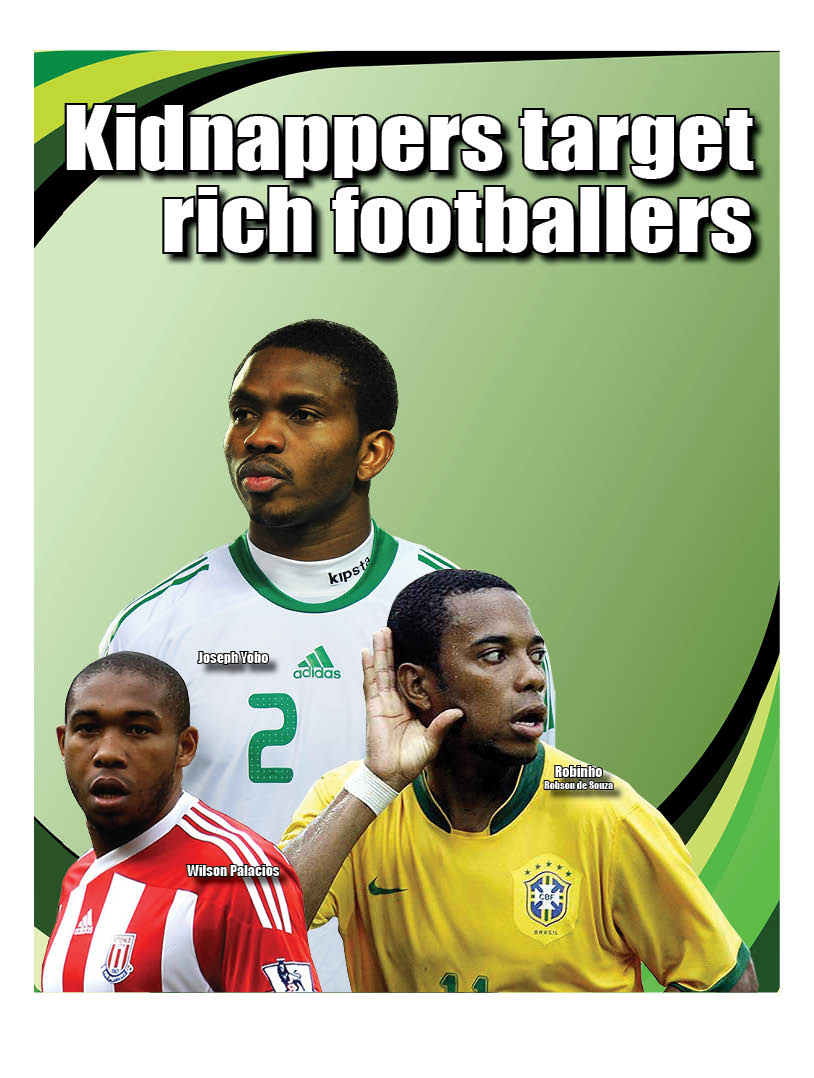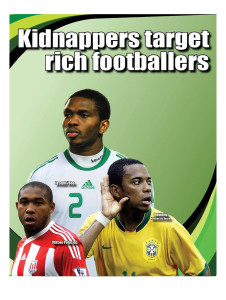Kidnappers target rich footballers
Kidnappers saw an opportunity for a big pay day just as Robinho was on the verge of a multi-million pound transfer to Real Madrid. Robinho’s mother, Marina de Silva Souza, 43, was preparing a barbecue with friends in Praia Grande, a working class area 45 miles from Sao Paulo, when gunmen burst into the house and bundled her into the boot of her car.
Nigerian Police rescued midfielder Christian Obodo, a player for Italy’s Udinese football club, a day after he was abducted by kidnappers who demanded a ransom of $187,500.
Chelsea midfielder John Obi Mikel’s father was kidnapped at one point by criminals who demanded a £2.4 billion ransom, which they considered “chicken change” for the football club, officials said. Authorities later traced Mikel’s father to the northern city of Kano and freed him.
Gunmen abducted the younger brother of Norwich defender Joseph Yobo as he left a nightclub in Port Harcourt, Nigeria in 2008. The brother was released unharmed about two weeks later, though it was unclear if a ransom was paid.
Kidnappings remain common in West Africa, especially in Nigeria, and in Brazil, South America. But in recent years there has been an increase in kidnappings in other parts of the world. And the main targets are rich footballers.
In Honduras, Edwin Palacios, the youngest brother of Stoke City midfielder Wilson Palacios, was kidnapped in 2007. After Wilson paid the £125,000 ransom for his brother’s return, the kidnappers did not release the 16-year-old.
In 2009, Edwin’s body was found buried in the mountains of Honduras, after having been missing for two years.
In Argentina, Erik Lamela’s younger brother Axel was kidnapped by armed carjackers on the eve of his home debut for Tottenham Hotspurs last year.
The 18-year-old Axel was taken at gunpoint in the Vicente Lopez area of Buenos Aires, the Argentine capital.
After being held prisoner for several hours, the kidnappers released him in exchange for a ransom of 5,000 pesos, about £550.
Also in October 2013, former Brazilian footballer Joao Rodrigo Silva Santos, 35, was kidnapped and decapitated by suspected drug traffickers in Rio de Janeiro.
The former player’s severed head had his eyes and tongue cut out and his head placed inside one of his own rucksacks, which was dropped in front of his door, police said.
The horror-struck wife of Santos, Geisha Silva, discovered it as she left the house for work.
According to ESPN, Santos was grabbed after leaving the local health food store he owned in the Realengo district, lower to middle-class area located in the west of Rio.
Many top Brazilian footballers have also seen their loved ones kidnapped by gangs in an attempt to extort huge funds for their release.
Marina da Silva Souza, mother of Brazilian footballer Robinho was abducted in 2004. The kidnappers sent Robinho a video tape of his mother in captivity, in which the kidnappers could be seen cutting off her hair.
“I don’t know what sort of people do these things. They are people with evil in their hearts,” Robinho, who now plays for AC Milan, said.
After 41 days, Robinho agreed to pay a ransom of $75,000 for the release of his mother. The following year, the player left Brazil for Real Madrid in Spain and took his entire family with him.
Also targeted was the mother of the Sao Paulo striker Grafite. During her kidnapping at the family home, Grafite’s father was tied up and gagged.
The sister of Zenit Saint Petersburg forward Hulk was taken hostage for a day before she was reunited with her family again in late 2012.
“We were preparing for my father’s birthday; we didn’t know that it was going to turn out to be his burial. It’s been traumatic and I don’t know why anybody would do that to my father,” former Nigeria defender, Chikelue Iloenyosi, said when the decomposed body of his father was found in Umuleri, Anambra State few months ago.
The 80-year-old father of the former German-based player, Mr. James Iloenyosi, was kidnapped by gunmen on November 25, 2013, on his way home from morning church service. It was few days to his 80th birthday.
The decomposed body of James Iloenyosi was only recognised because of the cloth and cap he had on before he was kidnapped.
Iloenyosi said the kidnappers demanded N50m (about £250,000) to release his father. But after bargaining with the gunmen, he was stunned to discover that they had killed his father.
“They (the kidnappers) called us on the phone that same day (he was kidnapped) and they demanded a N50m ransom, but we told them how much we could afford. We gave it to them. I don’t want to mention the amount because the amount in the media is different from what we paid,” Iloenyosi, a member of the Nigeria (under 20) Flying Eagles squad, said.
“They told us we would get him the night we paid; they told us to go to a junction in Enugu to pick him. We got to that junction at 10pm and we searched for him till 1am but we couldn’t find him and had to go back.
“After that day, they switched off their phones and we couldn’t reach them. We started doing our own investigation and I went to Lokoja, where one of them was arrested. We proceeded to Anambra State and the guy arrested in Lokoja told another member that there was another “business”. He fell for it and came to meet us, where he was arrested.
“After interrogation, they told us the man was dead and they took us to where his decomposed body was in Umuleri. One of them then told us that my father had died before they collected the money from us.”
This is the latest in a line of alarming stories involving footballers, their families and kidnappers.
In 2012, former Super Eagles midfielder, Christian Obodo, was kidnapped in front of a Church in Effurun, Warri, Delta State by four gunmen.
The gunmen reportedly tailed the player, who was in a car with a customised number plate ‘Obodo 5’ before they abducted him, blindfolded him and took him to a forest. They demanded €150,000 for his release.
He was lucky to be rescued a day later.
But whether the footballers are home, on holidays or overseas doesn’t really matter to the kidnappers.
Three years ago, two Nigerian soldiers assigned to Jos (a city in the northern part of the country), kidnapped Chelsea midfielder Mikel Obi’s father and demanded a £2.4bn ransom to release him.
Thereafter, one of the soldiers, Private Jaduwa Thlama was dismissed by the Nigerian Army. The other, Victor Essien, was referred to the higher prosecuting authority in line with Nigeria Army ethics.
Some ex-footballers have blamed the new trend on the players themselves, saying their lavish lifestyles attract the kidnappers.
However, it is known that kidnappers in South America and Africa would seize every opportunity to target anyone whom they consider to be a prized target.




